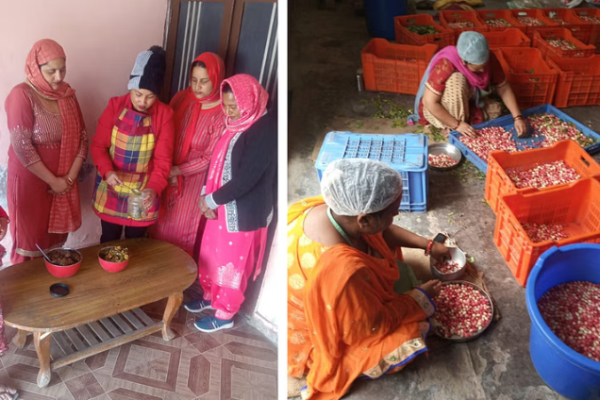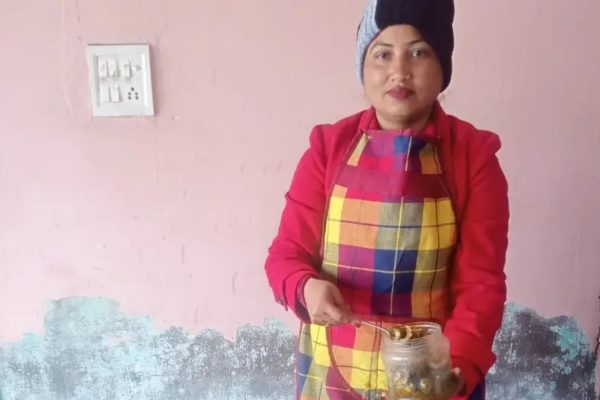Born into a middle-class family in Ramgarh Sikri village, Hoshiarpur district, Punjab, Rekha has a higher degree in sociology, IT and soil and water management. Despite receiving several job offers, she chose her path differently. She heads the ‘Shiv Modern Self-Help Group’, which provides sustainable livelihoods to village women.
The group currently consists of 350 members. This initiative processes natural fruits into various products including pumpkin, lemon juice, lychee juice, mango juice, cranberry juice, sweets, barfi, pickles, chutneys and bamboo pickles. They promote these products through farmers’ fairs, social media and e-commerce platforms, reaching national and international customers.

The beginning of her remarkable journey
It all started when Rekha was preparing for her tenth standard exam. One day she went to the sarpanch of her village to get her character certificate signed. There she saw a woman working in the harsh, scorching heat, trying to earn just Rs 50 to pay her daughter’s school fees. Rekha knew this woman well; she was her classmate’s mother. This incident deeply moved Rekha and she decided to do something impactful about it. She determined to dedicate her life to supporting women in society who face similar extreme hardship.
Establishment of the self-help group
With this thought and her father’s support, Rekha gathered thirteen needy women in 2003 to form the Sada Shiv Modern Self-Help Group. At first, she wasn’t sure where to start or how the group would function. They experimented with different activities from making detergent to other tasks but could not achieve the desired results due to the lack of resources and proper training.
One day, a team from the agriculture and horticulture department visited her village for a crop survey. Rekha recalls, “When the team heard about our self-help group, they encouraged us to make pickles from the fruits naturally found in the nearby forest area.” This suggestion gave them a glimmer of hope and they decided to give it a try. However, this venture also did not bear fruit due to their lack of education.
Times were challenging, Rekha and her group struggled to accurately measure spices, salt and other ingredients. Initially, Rekha considered involving trained women in pickle making to learn proper procedures, but they demanded high fees. Ultimately, Rekha sought training from the agriculture and horticulture department team for precise guidance. They received training from KVK Gurdaspur, Solan and other places, which improved the quality of pickle making. Despite hardships, Rekha remained committed to her education and achieved first division in grades 10 and 12, along with further qualifications.
Good luck in making and selling pickles at the Delhi exhibition
Over time, the self-help group was invited to an exhibition in New Delhi in 2012. Everything was new to them and they were scared at first. But thanks to her father’s encouragement, Rekha and her group managed to earn Rs 50,000 in a single day by selling their products. Their products were in high demand, so they had to source supplies from the village. All batches would be sold out in no time.
Something unusual happened during the exhibition. A man was seen buying pickles daily. Rekha recalls, “One day I asked him how he managed to buy and use pickles every day, and he said he would tell me on the last day. I was surprised and suspicious, but on the last day I found out he was a scientist who was researching the quality of our product. We found out he thought it was all natural, without preservatives.”
National recognition and continued success
The scientist’s research led to Rekha’s group receiving well-deserved recognition. They won a national award for natural fruit processing at the Delhi Haat exhibition, marking a turning point. The Chief Minister of Punjab visited, praised their work and awarded them around Rs 1.36 lakh. They subsequently also earned the State Prize in 2013. They now operate a processing unit on 2 hectares of land, focusing on forest fruits. They have about 570 products such as squash, candies and juices. They also excel at micro-packaging lychees.
Rekha Sharma: a role model and inspiration

Rekha Sharma is a beacon of hope and inspiration for women in her region. It has built a commendable reputation by making fruit and vegetable processing a viable livelihood. She continues to play an important role in conserving natural resources and promoting organic farming. Rekha Sharma’s journey shows that with determination, support and a willingness to take on challenges, you can achieve remarkable success and make a meaningful impact on society.
